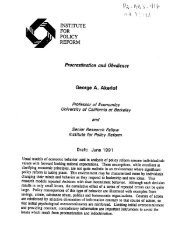Second Year (1949-1950): Toward Economic Growth ... - PDF, 101 mb
Second Year (1949-1950): Toward Economic Growth ... - PDF, 101 mb
Second Year (1949-1950): Toward Economic Growth ... - PDF, 101 mb
Create successful ePaper yourself
Turn your PDF publications into a flip-book with our unique Google optimized e-Paper software.
4<br />
The Marshall Plan and Its Meaning<br />
powers from going to the Moscow conference with substantial delegations,<br />
determined to find if possible an honorable modus vivendi with<br />
the USSR. Advisors to Marshall, in the American delegation, were John<br />
Foster Dulles, Benjamin V. Cohen, and A<strong>mb</strong>assador Walter Bedell<br />
Smith. Early progress on the agenda and procedural matters raised<br />
cautious hopes, but the talks began to bog down when they reached<br />
substantive issues.<br />
The conference had been in session for more than a month when<br />
Secretary Marshall was invited to confer privately, on April 15, with<br />
Prime Minister Joseph Stalin. Foreign Minister Vyacheslav Molotov<br />
was present and a stormy session ensued. Marshall became convinced<br />
that the Soviet government was stalling for time, that it was far from<br />
being ready to cooperate in any reasonable scheme for lessening distress<br />
and tension in Europe, and that it was in fact doing all it could to make<br />
the existing situation worse. 1 He also recognized that time was running<br />
against the forces of reconstruction in western Europe and that if anything<br />
effective was going to be done there it would have to be startedand<br />
started soon-by the Western powers. The forward thinking and<br />
recammendations which had been developing in the Department of<br />
State and elsewhere were soon brought into a new focus. Out of it<br />
developed the proposal for a European recovery program.<br />
Many Things to Many Men<br />
Conceived in 1947 and launched in 1948, the Marshall Plan evolved<br />
swiftly into a vast, spirited international venture. As the enterprise unfolded,<br />
it became many things to many men. .<br />
To millions impoverished by World War II it meant food, tools, a<br />
chance to work, a source of new hope. Worried leaders in western<br />
Europe saw in it an assurance of help on a scale that might enable them<br />
to cope with their most urgent recovery problems. To the governments<br />
of a nu<strong>mb</strong>er of war-torn nations outside Europe it meant assistance to-,<br />
ward economic stability and new development.<br />
Among the peoples who ultimately received Marshall aid, however,<br />
fears and hopes were mingled. Some were uncertain of American intentions.<br />
Some feared that by accepting new help they might jeopardize<br />
their freedom of action and, possibly, be drawn into another world war.<br />
Others welcomed the prospect of American aid as a potential factor in<br />
world politics and as an acceptance of responsibility by the nation whose<br />
resources and strength had figured so prominently in the victory of the<br />
1 Interview, Washington, October SO, 1952.

















